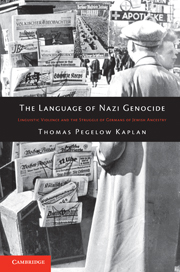Book contents
- Frontmatter
- Contents
- Illustrations
- Acknowledgments
- Abbreviations
- Introduction
- 1 “We Are All Germans; Why Then Ask for Religion?”: Cultural Identity, Language, and Weimar Pluralism, 1928–1932
- 2 “Racial and Social Boundaries between Germans and Jews Are to Be Strictly Drawn”: Dictatorship Building and the Process of Nazifying Language, 1933
- 3 Toward the Eradication of the “Impossible, Untenable Category of ‘German Jews’”: Enforcing and Contesting Racial Difference, 1935–1938
- 4 “The Jewess” Attempted to “Stage a Case on Her Descent”: Linguistic Violence as Part of Genocide, 1941–1945
- 5 “We Are Not Bad Jews, Because We Believe We Are Good and True Germans”: Another Beginning and Persisting Difference, 1945–1948
- Conclusion
- Appendix: Frequency of Key Categories of Germanness and Jewishness
- Bibliography
- Bibliographical Essay
- Index
- References
5 - “We Are Not Bad Jews, Because We Believe We Are Good and True Germans”: Another Beginning and Persisting Difference, 1945–1948
- Frontmatter
- Contents
- Illustrations
- Acknowledgments
- Abbreviations
- Introduction
- 1 “We Are All Germans; Why Then Ask for Religion?”: Cultural Identity, Language, and Weimar Pluralism, 1928–1932
- 2 “Racial and Social Boundaries between Germans and Jews Are to Be Strictly Drawn”: Dictatorship Building and the Process of Nazifying Language, 1933
- 3 Toward the Eradication of the “Impossible, Untenable Category of ‘German Jews’”: Enforcing and Contesting Racial Difference, 1935–1938
- 4 “The Jewess” Attempted to “Stage a Case on Her Descent”: Linguistic Violence as Part of Genocide, 1941–1945
- 5 “We Are Not Bad Jews, Because We Believe We Are Good and True Germans”: Another Beginning and Persisting Difference, 1945–1948
- Conclusion
- Appendix: Frequency of Key Categories of Germanness and Jewishness
- Bibliography
- Bibliographical Essay
- Index
- References
Summary
On October 1, 1946, the International Military Tribunal (IMT) in Nuremberg pronounced its verdicts in the trial of twenty-two high-ranking Nazi leaders. In September 1935, almost exactly eleven years earlier, the city had hosted the Nazi Party Rally and special Reichstag meeting, which passed the racial legislation that embodied the Hitler state's key definitions of Jewishness. On this October day, the presiding American, Soviet, British, and French IMT judges sentenced more than half of the defendants to death by hanging. Among the condemned men were Alfred Rosenberg, Wilhelm Frick, and Ernst Kaltenbrunner, the last head of the Reich Security Main Office. In their widely published opinions, the judges found the condemned defendants guilty of all or most points of the indictments, ranging from conspiracy to waging a war of aggression to war crimes. Three defendants, including Hans Fritzsche, a former head of the Propaganda Ministry's press department, were acquitted. Adolf Hitler and SS-chief Heinrich Himmler, the architects of Nazi terror and genocide, had committed suicide to evade capture by the victorious Allied troops in the spring of 1945 and could no longer be punished.
Allied officials prosecuted the Nazi regime's genocide of the German and European Jews by adding the new charge of crimes against humanity, defined as the deportation and destruction of civilians “on the basis of political, racial, and religious grounds.
- Type
- Chapter
- Information
- The Language of Nazi GenocideLinguistic Violence and the Struggle of Germans of Jewish Ancestry, pp. 219 - 271Publisher: Cambridge University PressPrint publication year: 2009



